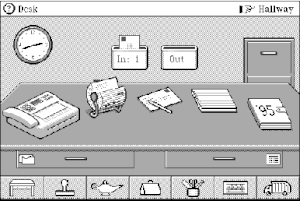Magic Cap
 | |
| Developer | General Magic |
|---|---|
| Working state | Discontinued |
| Source model | Closed source |
Magic Cap (short for Magic Communicating Applications Platform) is a discontinued object-oriented operating system for PDAs developed by General Magic. Tony Fadell was in charge of the platform. Darin Adler was an architect.[1]
Magic Cap incorporates a room metaphor, where the user navigates from room to room to perform various tasks, such as going to a home office to perform word processing, or to a file room to clean up the system files. Automation is based on mobile agents but not an office assistant.
Several electronic companies came to market with Magic Cap devices. The most notable are the Sony Magic Link and the Motorola Envoy, both released in 1994. None of these devices were commercial successes.
Mobile agents
The Magic Cap operating system includes a new mobile agent technology named Telescript. Conceptually, the agents would carry work orders, travel to a Place outside of the handheld device, complete their work, and then return to the device with the results. When the Magic Cap devices were delivered, the only Place for agents to travel was the PersonaLink service provided by AT&T. The agents had little access to functionality, since each agent had to be strictly authorized and its scope of inquiry was limited to the software modules installed on the PersonaLink servers. The payload carried by these agents was also hampered by the slow baud rate of the modems in the devices of 2400 bit/s.[2]
The authentication/authorization system of the mobile agents in Telescript created a high coupling between the device and the target Place. As a result, deployment of agent-based technology was incredibly difficult, and never reached fruition before the PersonaLink service was shut down.[3]
See also
References
- ↑ "Darin Adler". Boost C++ Libraries.
- ↑ "Magic Link Users Guide (primary manual)". Sony eSupport.
- ↑ "AT&T severs PersonaLink for PDAs". CNET News. July 11, 1996.
External links
- Archive section and "time capsule" dedicated to Magic Cap – Pen Computing Magazine
- "Making Magic" – a developer’s introduction to General Magic and Magic Cap by Richard Clark, Scott Knaster, and the staff of General Magic (from Mactech 11:5)
- Magic Cap Resources – a combination blog and gallery with links to Magic Cap software, documentation and other information. Also includes a photo gallery of Magic Cap devices.